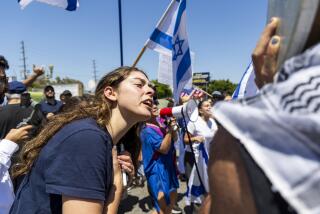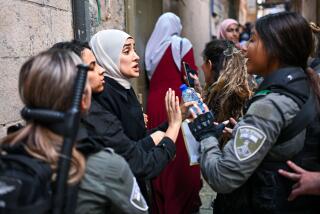Baghdad Clerics Decry a U.S. âWar Against Islamâ
BAGHDAD â Shiite Muslim clerics in a poor neighborhood of northeast Baghdad said Friday that the U.S. military had declared war against Islam and warned American forces to stay out of the district, where U.S. troops opened fire on a crowd this week.
Tens of thousands of worshippers carrying religious banners thronged to Friday prayers in the center of the slum, sending a powerful signal about the level of anger in the community over Wednesdayâs shootout between protesters and troops, which happened after an American helicopter dislodged a religious banner from a tower.
âAmerica and Zionism have declared war against Islam and its sanctuary. That is why one of their helicopters tried to remove the banner of righteousness,â Sheik Abdul-Hadi Darraji told the crowd before prayers.
âI call on everybody to condemn this flagrant aggression of this sacred place.â
But the clerics sent a mixed message, employing inflammatory rhetoric yet stopping short of calling for violent resistance. They warned troops to stay out of the neighborhood, but also called on residents to stay calm and show restraint. Some in the crowd were swathed in white banners with red script, symbolizing that they were ready to die for their cause.
Darraji is loyal to Muqtader Sadr, son of a Shiite leader who was killed by Saddam Husseinâs government in 1999. Sadrâs view on the helicopter incident is seen as a key to whether the issue could become inflamed, leading to further Shiite violence and protests, or whether the community will become calmer. On Friday, Sadr was urging a peaceful stance toward coalition forces.
But Sadr has also formed an âarmy,â and clerics who spoke Friday described their plans to patrol the neighborhoodâs streets in place of U.S. troops.
Shiites and U.S. military officials differ on what happened Wednesday in the Thawra neighborhood, popularly known as Sadr City in honor of Sadrâs slain father, Mohammed Sadeq Sadr. People in the neighborhood said a soldier in the helicopter leaned out and cut the banner off the tower. But the military officials said the banner was accidentally dislodged by the helicopter, triggering angry protests below. Troops opened fire, killing one person and wounding four, after members of the crowd fired small arms and a rocket-propelled grenade, or RPG, the Americans have said.
The Americans said the patrol shot the RPG gunner, while Shiite leaders said a young boy was killed.
The incident illustrates the delicacy of military operations in Iraq and the danger of inflaming local sentiment by upsetting religious or cultural codes. The neighborhood, neglected and oppressed under Husseinâs regime, initially was somewhat supportive of the U.S.-led coalition for its role in toppling the former government. Darraji on Friday likened coalition forces to the former dictatorship.
âThe Americans, who say they are trying to secure human rights are in fact ... doing things just like Saddamâs regime,â he said, adding that the situation in postwar Iraq was âgoing from bad to worse compared to Saddamâs era.â
A local U.S. military commander has sent a written apology to religious leaders over the removal of the banner and announced that coalition forces were scaling back patrols in the neighborhood. Darraji asserted Friday that the removal of the flag was not accidental, but must have been the result of an order issued from military leaders, a viewpoint later echoed by those who attended prayers.
He insisted that the apology was inadequate and demanded another one from a higher-level military official. He said the Al Mahdi army, the name of the militia recently created by Muqtader Sadr, would take control of security in the area. The group is divided into eight divisions, he said: four to cover Thawra and four to secure surrounding areas.
Religious leaders have given contradictory statements in the past on whether this group will be armed, though most Iraqi men own guns.
âIn case these demands are not fully met, then we will not bear any responsibility for what might happen to their forces if they enter the city again,â Darraji said, referring to Thawra.
U.S. Army Col. Guy Shields said Friday that the military takes the issue very seriously and is investigating. He would not comment on the U.S. response to the clericsâ demands, other than to rule out withdrawing from the neighborhood.
âWe still have a security mission that has to go on in that area,â he said.
There was âno intentional provocation,â he added. âObviously it was perceived that way, but not intended that way.â
In Thawra on Friday, one Al Mahdi army volunteer, Ammar Abdul Kareem, 32, said the Americans should heed the warning not to enter the neighborhood.
âItâs banned for them to enter. If they do, we have our special weapons and we will resist. We are going to defend our country and we are going to defend our hawza to the very last drop of blood.â The hawza is the leading group of Shiite scholars and institutions based in the Iraqi city of Najaf, one of the holiest cities in Shiite Islam.
Another volunteer, Jaafer Elaiwi, 43, said Al Mahdi is an army of peace. He said Fridayâs speech had calmed sentiments somewhat, âbut if the incident is repeated, the anger will be doubled.â
Amid the crowd was a large poster of the assassinated Mohammed Sadeq Sadr. In the central Iraqi town of Kufa, his son called Friday for peaceful resistance to what he called Western aggression.
âThey are trying to provoke you into violence,â said Muqtader Sadr in remarks delivered at the Kufa mosque. âI donât call for bloody resistance, but peaceful resistance.â
*
Times staff writer Edmund Sanders contributed to this report.
--- UNPUBLISHED NOTE ---
In stories after April 9, 2004, Shiite cleric Muqtader Sadr is correctly referred to as Muqtada Sadr.
--- END NOTE ---
More to Read
Sign up for Essential California
The most important California stories and recommendations in your inbox every morning.
You may occasionally receive promotional content from the Los Angeles Times.










